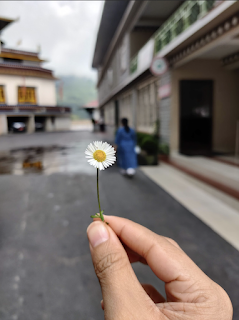Of an unsung war hero
Julley!
I recently took a trip to Leh-Ladakh and this is how Ladakhi people greet one and all.
Ladakh has 2 contrasting sides to it. One which showcases/flaunts a landscape so majestic and vast that you don’t feel like it can be a part of India. And with so many foreigners touring beside you, it is more natural for you to feel like you are on foreign land. However, the 2nd and stronger side of Ladakh ensures you snap out of this delusion within seconds and that is the Indian Army. Throughout Leh and Ladakh, in fact, right from Manali you will find numerous Army quarters, camps, bunkers, convoys and Army personnel. Find men at Khardung La or Chang La not shivering in sub zero temperatures without even wearing one extra layer to keep themselves warm? Yes, that’s Indian Army for you - stationed at altitudes so high and terrains so difficult that you cannot even imagine it leave alone fathom it.
Of all the places that I visited, Hall of Fame in Leh is one that had the most impact on me. Built and maintained by the Indian Army, Hall of Fame is a museum that holds the memories of brave Indian soldiers who lived their lives protecting us and died for the same cause. It is house to the heart-wrenching stories of how our soldiers showed indomitable spirit even when faced with death mainly in the Indo-Pak and Indo-China wars among others. This beautiful museum is divided into various sections for display. There is a section portraying the facts, culture, geography and history of Ladakh; a souvenir shop, sections occupied by the pictures of Kargil wars and Indo-China wars. There are separate sections to cover the services/ sacrifices by Indian Air Force and the Siachen warriors respectively. But, that one section which stood out tall and which slowed down the pace of all visitors was the one named “Lest We Forget”. This hall has walls showcasing the photographs and heroic stories of our soldiers. As you go on reading them, you find yourself in goose bumps or fighting to hold back your tears. Your eyes that glittered big reading ‘Param Vir Chakra’ or ‘Maha Vir Chakra’ next to their names automatically closes in sadness after seeing the word ‘Posthumous’ appended to them in brackets. You find your mind in turmoil trying to figure out what it must feel like to stay away from your family, to be faced with wreck less hatred from enemies, to see your chosen family die in front of you & not be able to spare any minute mourning by their side, to enter into combat with a bullet struck body and to finally die protecting millions that you’ve never seen in your life nor be seen in theirs. You also find yourself awestruck at the generosity of the Indian Army that has allowed to display letters written by Pakistan Army men to their families, among the letters of their own men.
One particular letter that moved me was from Captain Vijayant Thapar who gave his life for the country at a young age of 22 fighting at the border in the Battle of Tololing and Three Pimples. Belonging to a family which had served Army for a long time now right from his great grandfather, Vijayant carried on the legacy of the Thapar’s family.
(click on the images to maximise them)
Ruksana, who is mentioned in his letter was a 6-year-old who lost her speech when her father was brutally murdered by militants in front of her eyes in her village in Kupwara, Jammu & Kashmir. It took all of Capt. Vijayant Thapar’s love and efforts, who was then stationed at Kandi, to get back her speech. He used to contribute a small amount of money to her poor family which his parents now continue as per one of his last wishes.
Below is what Col. V. N. Thapar - Vijayant's father's reply to his son's letter was.
I would urge you all to read his entire story at http://www.captainvijyantthapar.com/
Coming out of the Hall of Fame, you find yourself remembering the slogan – “What is like a lifetime adventure to many of you is a daily routine to all of us” painted outside army quarters on your way, and, you find your shrunk-self looking up to them with greater respect.
For, “This is the army! Nobody can do the best they can”.









Comments
Post a Comment